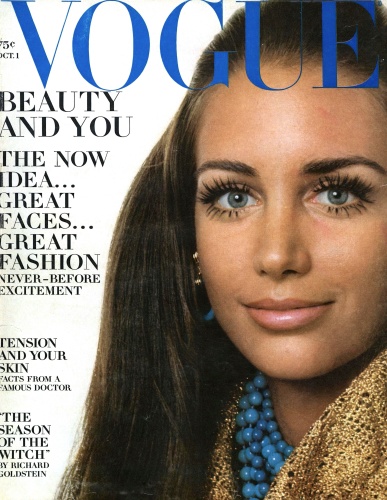
To listen to this reflection as a podcast, click here.
Windsor Elliot was blessed with one of the world’s most beautiful faces.
During her meteoric rise as a fashion supermodel in the 1960s, she appeared on the cover of Vogue four times, including the one displayed above.
Diana Vreeland, the magazine’s editor-in-chief, coached her models with a simple six-word maxim: Fake it, fake it, fake it. At the height of her fame, Windsor began to grasp just how fake her life really was.
She had never planned on becoming a model. On a whim she had tried out for a summer modeling job near her home in San Francisco. She was as surprised as anyone when she was suddenly catapulted to international stardom. Her life seemed as unreal as her name – she had chosen “Windsor Elliot” on a lark.
Her childhood had not been easy. Her parents divorced when she was only four, and their new partners were alcoholics. After a bitter custody battle in which no one came out a winner, she became a ward of the state of California. For a time she lived in a juvenile center that seemed to have been lifted from the pages of a Charles Dickens novel – a place of mindless authority, hopelessness, and chaos. She grew up without a single memory of anyone telling her that trusting God might be a viable option for facing life. That was fine. She would carve her own path.
That path took an unexpected turn when she was invited to a party in Paris hosted by Salvador Dali, the world’s most famous surrealist painter.
All the beautiful people were there. She was one of them. The elegance and extravagance were over the top. In the midst of it all was Dali’s pet ocelot, a large cat native to the jungles of South America, which was wearing a stone-studded collar and circulating freely among the guests. It occurred to Windsor that this extraordinary animal, which ought to have been running wild and free, was now utterly domesticated. And so were all the people at the party, reduced to holding their drinks and bantering about meaningless trivialities.
Was there any authentic mystery and meaning to life – something that wasn’t fake?
Sometime later, while walking down New York City’s Fifth Avenue on a summer evening, she cried out, “God, I can’t find you. If you are there, would you please find me?”
Writing today under her married name of Jenny Guinness, she shares the story of how she became a follower of Jesus. Her memoir is called Faces. The face, of course, is central to the traditional notion of beauty. Notice that the Vogue cover above teases a feature story on the subject.
Jenny points out that everybody has three faces. First, there’s the face we’re born with. Second, there are the various faces we “put on” throughout our lives – the cosmetic, emotional and social masks we wear in order to appear happier or wiser or more alluring than we really are. Finally, there’s the face we are becoming – the visage that reflects the person who is gradually emerging over the course of a lifetime.
Our culture is overwhelmingly preoccupied with the transition from Face 1 to Face 2. Entire industries are committed to this mission. Cable TV programs assure us that no one needs to live with the heartbreak of wrinkles, worry lines, and turkey necks.
It’s the journey from Face 2 to Face 3, of course, that actually matters.
Many of us struggle with what psychologists call the crisis of the False Self. There is a distance between who I really am and the person I think I should be. For some of us, that gap feels as wide as the Pacific Ocean. We put on a face that smiles, even though we are sad. A face that exhibits confidence, even though we feel inept. A face that exudes joy in someone’s presence, even though quite frankly we would much prefer to be alone. The wider the gap, the more weariness we feel.
That’s because “impression management” is an exhausting and dispiriting way to live. It’s definitely not the way God intends for human beings to live.
The most important call in your life is not what you do. It’s who you become. In his book The Me I Want to Be, author and pastor John Ortberg wisely observes, “When I am growing toward the me I want to be, I am freed from the me I pretend to be. I no longer try to convince people I am important while secretly fearing I am not.”
How does such a thing happen?
It happens slowly. But as we offer ourselves day by day to God’s Spirit, it also happens surely.
The apostle Paul writes in 2 Corinthians 3:18, “And we all, who with unveiled faces contemplate the Lord’s glory, are being transformed into his image with ever-increasingly glory, which comes from the Lord, who is the Spirit.” This is an astonishing promise. Our “face,” our real self, is being transformed into Christ’s image – his very self.
That process begins in this world and isn’t completed until we receive the gift of wholeness and holiness in the next.
In the meantime, we don’t have to fake it, fake it, fake it to make it through life.
By God’s grace, we can develop more and more of the beautiful “face” that reflects the identity of our Lord.
